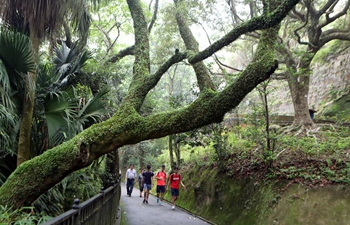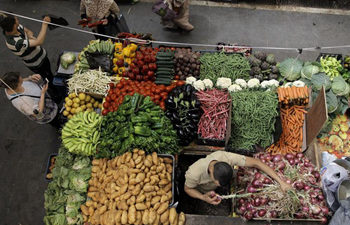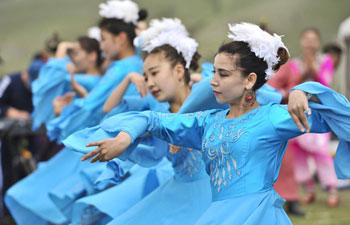By Burak Akinci
ANKARA, June 1 (Xinhua) -- A controversial draft law proposed by the Turkish government to Parliament is causing serious concern for the olive groves in the country and producers of the liquid gold fear that the scheme may harm ages-old trees.
In an unexpected move the ruling Justice and Development party (AKP) has backed down on Wednesday on some critical articles of the draft submitted to Parliament as part of an omnibus bill after heated debates among lawmakers, but concerns persist nevertheless among oil producers who are struggling against the regulation.
Proposed changes to "The Olive Law" which has protected Turkey's olive trees since the late 1930's, during the reign of Mustafa Kemal Ataturk, the founder of modern Turkey, could result in thousands of trees being cut down and olive groves replaced by mines, industrial projects and housing schemes deemed to be "public benefits."
The AKP made a last minute change to the draft in order to ensure that residential and touristic schemes should be left out but this diplomatic move did not satisfy olive oil producers lobbying for nearly a week in capital Ankara and meeting with minister of industry and technology Faruk Ozlu in this bid.
Under the current law, olive groves are free from any kind of industrial activity other than olive oil production.
"This backing down on some articles of the draft is far from being satisfactory. What we demand is that this project be scrapped all together. Don't revise it, cancel it!" said to Xinhua Dr. Mustafa Tan, executive director of Turkey's National olive and olive oil council.
This leading expert on the field explained that similar bills were presented to Parliament six times in the past 14 years and withdrawn each time because of popular demand and major objections from opposition party's.
"There were not enough discussions and neither consensus on this draft between the ruling party and producers. The olive and olive oil sector concerns some 1,25 million people in Turkey and adopting such a law will be very prejudicial for them," said Tan.
Olive cultivation in Turkey is not only a major source of income for many families, it is also historically symbolic of the country's Aegean culture and dates back to 4.000 B.C. About 95% of the world's olive trees are located in the Mediterranean region.
The main opposition party, Republican People's Party (CHP) is campaigning against the project.
"This bill still constitutes a threat to the olive oil sector as long as the government is as ever eager as it is to build throughout the coastal lines of Turkey for major profits," said lawmaker Arif Ekici to reporters, reminding that it takes at least 20 years to get good production from an olive tree.
Other significant ecological groups such as TEMA, the foundation for combatting soil erosion, also opposed the project which, according to them, will kill ages-old olive trees on the Mediterranean and Aegean coast of Turkey by allowing mining, industrial and housing projects on olive groves.
Under existing law, olive groves are expected to have no more than 15 trees per decare (1,000 square meters, or approximately 0.25 acres). If the new law gets the green light, any olive grove housing less than 15 trees per decare will not be classed as an olive grove.
But according to experts, the main olive trees in the sunny Mediterranean and North Aegean regions of Turkey have planted traditionally 10 meters x 10 meters according to old know-how. So in most of the olive groves, the number of olive trees are naturally less than 15 per decare.
Currently, olive growing land is "protected" from any industrial activity other than olive oil production. This encompasses the grove and land within a three-kilometer radius. According to Yurtkuran, many small olive groves have been encroached upon by industrial, mining and housing projects.
Dr Tan thinks that if this bill becomes law, larger groves will be put into danger because of the "public benefit" clause which would permit local authorities to choose more lucrative industrial plants.
"Turkey has some 170 million olive trees, if this draft passes, we could be confronted to lose 100 million of them, it is that grave," indicated Tan.
The draft law has caused a protest of public expression in social networks and several ecological groups have launched a petition on line called "Don't touch my olive tree" to raise public awareness. Over 25,000 people have signed the petition until now.
The government, now in its fourth term in office, first attempted to change the olive law in its second term. Fears have been expressed that the government is stronger and more confident in getting the draft passed following April's approval of the presidential regime which granted actual president and AKP leader Recep Tayyip Erdogan sweeping executive powers.
Under current Turkish law, anyone who unlawfully cuts down an olive tree faces a fine of 2,000 Turkish Lira ($560) per tree. The draft amendment aims to remove the three-month prison term for unauthorized animal grazing on olive land; offenders would instead be fined 5,000 TL (around $1,400).
Turkey's olive oil exports have decreased dramatically these last year's due to increase in prices and other factors. According to figures released by the sector, several of Turkey's active exporting companies have left the market.
Turkeys production costs are higher than foreign production costs in countries such as Greece, Portugal and Italy because namely of harvesting circumstances and higher labour costs, hence the price of Turkish olive oil is higher and the country can't compete in the foreign market.
Fake products and frauds also soil the sector's reputation causing consumers in Turkey to divert to other products.
Olives in Turkey are served for breakfast every morning and has become a way of life. Olive oil is also the cornerstone of the Mediterranean diet and is proved to reduce cancer and heart diseases and to prevent strokes.

















